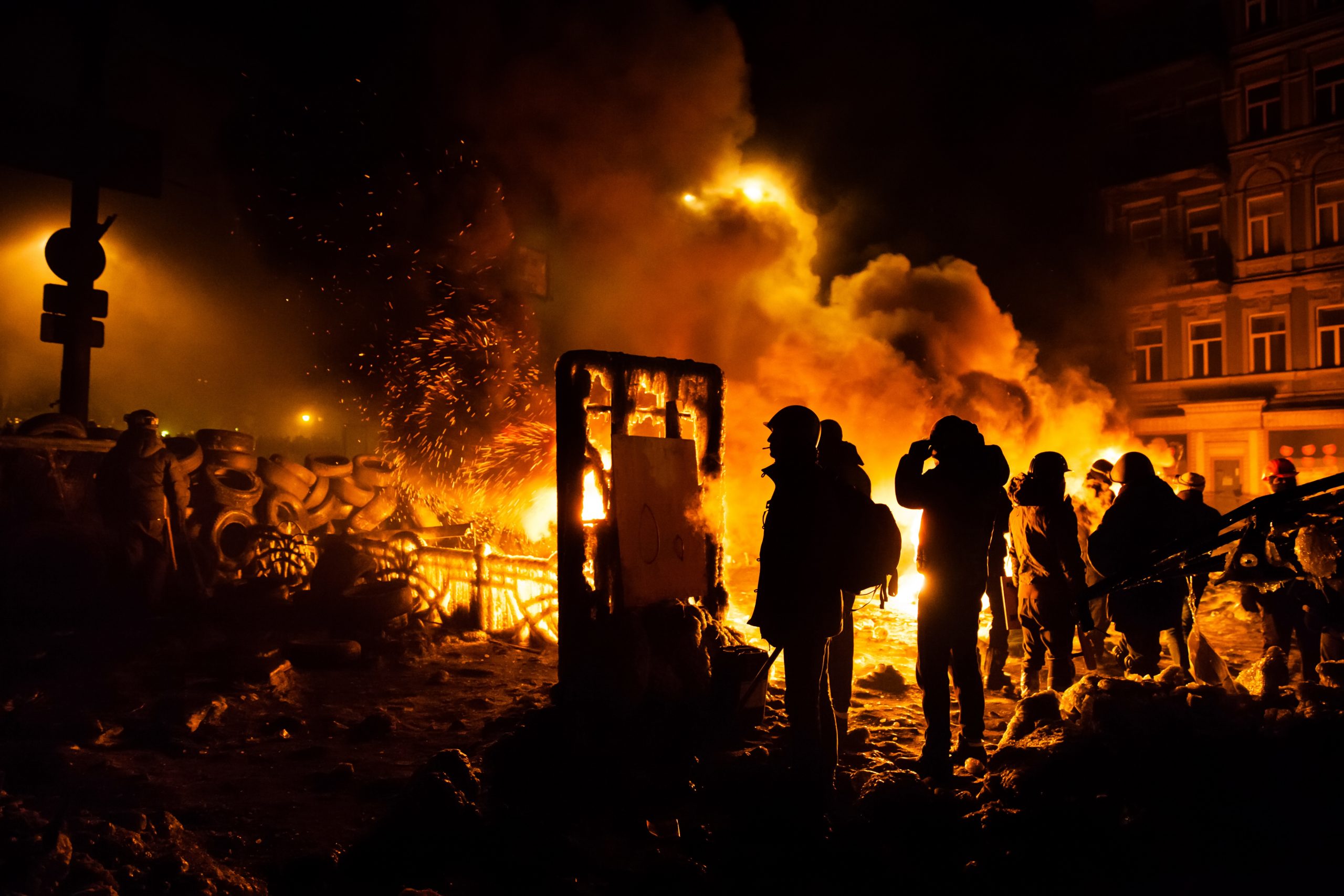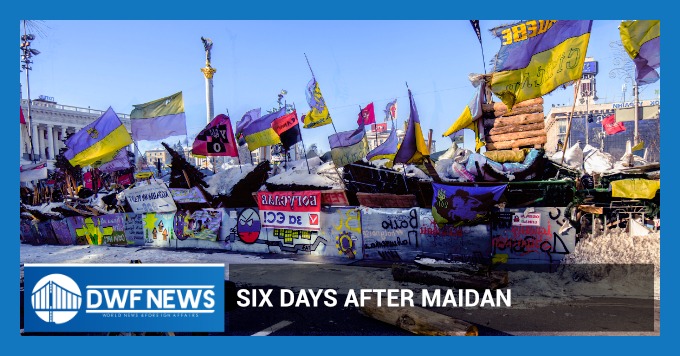Written By Edward Lozansky, Ph.D.
President | US-Russia Organization
March 2, 2020

Ukraine: Six Years After the Maidan
Written by Steven Pifer, a William J. Perry Fellow at FSI’s Center for International Security and Cooperation and Europe Center.
Unfortunately, the Kremlin appears content to continue the simmering conflict as a means to pressure, destabilize and distract Kyiv and to make it harder for the Ukrainian leadership to get on with its goal of building a successful and prosperous state. Absent a change in Moscow’s approach, Mr. Zelensky will not be able to achieve peace in Donbas (Crimea will, in any case, remain as long-term point of dispute between Ukraine and Russia). People close to the Ukrainian president suggest that, if the Russians continue their current course, Ukraine at some point may adopt a Plan B. That could entail building a virtual wall along the line of contact and pushing the entire economic burden of occupied Donbas on to Russia.
Mr. Zelensky and his government cannot on their own resolve Donbas. They can only hope that, as the costs of occupation mount for Russia, including the costs imposed by U.S. and Western economic and financial sanctions, the Kremlin will look for a different course of action.
Mr. Zelensky and his government can, however, effect domestic reform by themselves and take other key steps, such as curbing the oversized political influence of the country’s oligarchs. The government has secured a number of reform laws over the past six months (some perhaps not as well thought-out as they might have been) and has set ambitious plans for domestic and future growth. If they can deliver on those plans — possible though not guaranteed — Ukraine will develop as a stronger and more resilient state. That will be a state better able to withstand Russian pressure and a state reflective of the aspirations that triggered the Maidan Revolution.
Dr. Edward Lozansky’s Response to Steven Pifer:
As a result of Soviet Union’s collapse, its 15 former republics became the Newly Independent States, Ukraine among them. Free from the communist yoke, having strong industrial and agricultural sectors, a favorable climate and fertile land, Ukraine had great potential to become one of the most prosperous European countries. That is, if its leadership had chosen a political course that took into account the country’s centuries-old economic, family, cultural and religious ties with Russia.
Effective anti-corruption reforms, a certain level of autonomy for the regions with large Russian ethnic population, two state languages and neutral status with no membership in any military blocs would have made Ukraine if not a new Switzerland then definitely a happy and prosperous state. There would be no civil war and Donbass and Crimea would still be a part of Ukraine.
However, some inside and outside forces had a different agenda which resulted in the current tragedy, loss of life and territory, radical nationalism on the rise, economic devastation, millions of skilled workers forced to leave the country in search of manual jobs in foreign lands to survive and support their families.
The list of those responsible for this tragedy is long but I’d limit it to outside players who believed that they knew better what Ukrainians need.
Immediately after Ukraine became independent, many billions of US dollars were invested in the country. However, most of it went not into its economy and infrastructure but into reformatting public opinion against Russia and towards joining NATO. Assistant Secretary of State at the time Victoria Nuland, who became the Mother of the so called Maidan Revolution, has admitted that the figure was 5 billion of US taxpayer’s funds. However,many believe that if one adds both covert and overt US funds plus contributions from Soros, Canada, and the EU the total amount would increase substantially.
In 2004 it looked like the West got what it wanted by instigating the Orange revolution and forcing a third round of presidential elections that brought to power the anti-Russia and pro-Nato candidate Victor Yushchenko.
However,during his term Yushchenko was not able to solve the country’s economic or mega-corruption problems. He also failed to make the prospects of joining NATO more attractive to the Ukrainian people since the majority was still opposed to this idea.
Victor Yanukovich who lost to Yushchenko in 2004 became president in 2010. He was labeled by the West as pro-Russian but actually he was more pro-money and although he dropped NATO membership as a goal Secretary of State Hillary Clinton reminded him that “NATO’S door remains open.”
Many in the West who agreed with Zbig Brzezinski that the best way to push Russia into a geopolitical corner is to break its ties with Ukraine were dissatisfied with the slow pace of this process and were restlessly thinking about how to speed it up.
Enter the foreign ministers of Sweden and Poland, Carl Bildt and Radek Sikorski, who came up with the European Economic Association scheme which promised huge benefits to Ukraine on condition that it turned its back on Russia. It is obvious that this scheme had nothing to do with bringing prosperity to the Ukrainian people. The logical way for that would have been a trilateral agreement between the EU, Russia and Ukraine whereby the latter could enjoy the benefits from dealing and friendship with all sides. However, the interests of the Ukrainian people were the last thing on the minds of Bildt, Sikorski, and many others who pushed the corrupt but democratically elected Ukrainian president Yanukovich to sign the EU Association agreement and then supported the coup against him when he delayed doing so without revisions to ease negative impacts on his country.
Many in the West, including government officials, played active roles on behalf of the coup plotters. Some like Vice President John Biden’s son Hunter or former Polish President Aleksander Kwasniewski also managed to make a fortune on Ukraine’s tragedy. Radek Sikorski was rewarded with a Harvard professorship despite being caught saying the same 4-letter words or worse against the United States as Victoria Nuland did against the EU.
At this time, there are no signs that the end of the Ukrainian tragedy is close. President Volodymyr Zelensky who won the 2019 elections promising to end the war turned out to be too weak to implement the Minsk agreements. Even if he was sincere when pledging to do this during the presidential campaign, there are many powerful forces inside and outside Ukraine that would not allow him to do that.
One could easily dismiss the pathetic professor Pamela Karlan from Stanford when she committed plagiarism using President GW Bush’s words during the recent Trump’s impeachment process. Speaking in August 2007 at the 89th Annual National Convention of the American Legion in Reno, Nevada GW Bush said, referring to the use of the US military in Afghanistan and Iraq: “Our strategy is this: We will fight them over there so we do not have to face them in the United States of America.”
Karlan’s, i.e. Bush’s expression, was then repeated many times during the Trump’s impeachment process and on as the main justification for providing financial help and lethal weapons to Ukraine to keep the war going on.
Judging from the practically unanimous bipartisan support of this mantra, the conventional wisdom of US foreign policy is that a Russia-Ukraine war is useful to contain Putin and limit the Russian sphere of influence.
Unfortunately, those who share this vision are the same people who disagree with Trump’s views that good US-Russia relations are good for America.
All that means that the 6-year Ukrainian war has no end in sight just like the wars in Afghanistan (19 years), Iraq (17 years), Libya (9 years), and Syria (9 years).
One of the reasons I voted for Trump in 2016 was that he promised to end these wars. Needless to say, I am deeply disappointed since despite President’s impressive achievements in economics and international trade affairs his foreign policy is an obvious failure. That means that nowadays the prospects of peace and security for the United States and the world do not look too encouraging.
What is World Federalism?
World Federal Government (WFG)
Original Publisher
The Washington TimesEdward Lozansky is president of the American University in Moscow. He is the author of the book Operation Elbe, which describes joint US-Russia anti-terrorist efforts.
Related Articles
LIST of Articles DWF NEWS 5/28/25
Children, Civilians Burned Alive as Israeli Warplanes Target School, Home in Gaza Palestine Chronicle staff 'Can't Remain Silent' on Jewish Atrocities: Malaysian Foreign Minister Says at ASEAN Foreign Ministers' Meeting Aamir Latif Anadolu Agency ...
LIST of Articles for DWF NEWS 5/14/25
Should "Israel" Be Declared A Terrorist Entity? Kevin Barrett Israel Is Spiraling Ori Goldberg The Nation 'Our Position on Palestine Is Not Fringe' Janine Jackson FAIR Latecomers starting to join PEOPLE OF CONSCIENCE Multiple Western Press Outlets Have...
List of Articles for DWF NEWS 4/30/25
PEOPLE OF CONSCIENCE absent among WASP & Zionist elites Imperial Cowardice: Gaza & the Moral Collapse of the American Elite Mohamed El Mokhtar The Palestine Chronicle Where is the Arab Street? Asad Abukhalil Consortium News Gaza exposes the rot of...
Solving Global Problems
We can work together to make the world better

